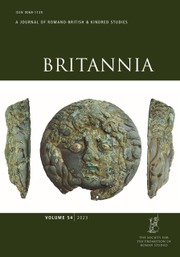Article contents
The Settlement of Veterans Discharged from Auxiliary Units Stationed in Britain
Published online by Cambridge University Press: 09 November 2011
Extract
In my Legionary Recruitment and Veteran Settlement during the Principate, I showed that legionary veterans displayed an increasing tendency to settle at the stations where they had served, rather than return home or move elsewhere, and that such settlement encouraged the development of hereditary service. The army indeed became so dependent on hereditary service that it was eventually made compulsory, probably by Diocletian.
- Type
- Articles
- Information
- Copyright
- Copyright © J.C. Mann 2002. Exclusive Licence to Publish: The Society for the Promotion of Roman Studies
References
BIBLIOGRAPHY
- 2
- Cited by




